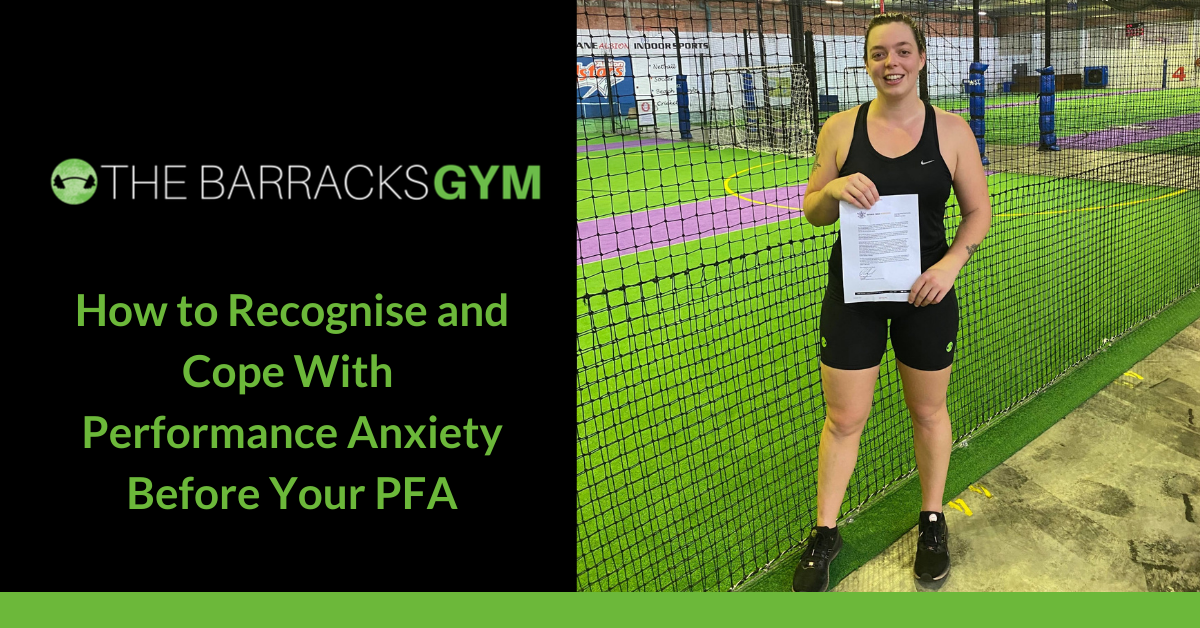|
Being in the right frame of mind is essential for being tested. It doesn't matter how much you've trained, how much you trust your body or how ready you feel for the Physical Fitness Assessment for the ADF. If you're prone to anxiety and stress over performance in general, you can easily underperform. I'm not telling you this to scare you or stress you out in advance, but rather to help you understand that the risks of performance anxiety are genuine, but you can prepare for it and learn how to handle it, so it doesn't jeopardise the outcome of your PFA. What Is Performance Anxiety? It's natural to feel nervous before an important event, whether in sports, acting, an assessment or exam, or public speaking. However, anxiety becomes a problem when your job is dependent on such performances or when it starts to damage your quality of life substantially. Performance anxiety is, to some extent, a beneficial set of feelings. It triggers a "fight or flight" reaction that prepares the body for the threat it sees, making us more alert and ready for action. Many people find that these feelings go away on their own once the event starts or soon after, and the feelings aren't strong enough to stop them from performing. But for some people, pre-event anxiety can be so bad that it keeps them from achieving what they want. You can experience performance anxiety in a range of situations in life, and it can pose a real challenge for some Australian Defence Force applicants we work with at The Barracks Gym. It's worth noting that performance anxiety can happen to people who aren't usually nervous. Even the best athletes or musicians can have problems under pressure, so even if you don't think it's a problem for you, it's worth understanding how to recognise it and what you can do to cope. How To Recognise Performance Anxiety Researchers often put mental and physical signs of performance anxiety into different groups. These are some common physical signs of performance anxiety:
Some common mental signs of pre-event anxiety are:
What You Can Do to Cope and Perform Your BestSo, imagine that you've done the exercises assessed during your PFA and never once had any issues at practice before, but when it matters, you seem to have forgotten it all. It's a scary feeling and state of mind, so it is essential to have a few techniques up your sleeve to combat self-doubt and performance anxiety. #1. Train for Your PFA Well, this doesn't need much explaining. One of the primary sources of anxiety before an assessment is if the applicant doesn't feel they have it because of a lack of proper training and preparation. You have more work to do if you are not ready and can't bring the expected result during a mock assessment. #2. Practice Positive Self-Talk When a negative comment comes into your head, you need to recognise it and stop it from spreading. Have a conversation with yourself and dig into all the positive experiences you had during your training. "Let's go and smash that beep test like I always do." or "Push-ups are where I excel, I got this!" are examples of motivation you can repeat to yourself on the day of your PFA. #3. Give Your Body What It Needs to Be in Top Shape Limit your intake of caffeine and sugar on the day of the assessment. Eat a healthy meal a few hours before your test, so you don't get hungry and are full of energy. Get plenty of sleep the night before and focus on lean proteins and your favourite pre-event carbs. The days leading up to your PFA and the morning aren't the time to try supplements or ingredients you never tried. Stick to what you know will work. #4. Pump Up The Volume It's no accident that many athletes have earphones plugged into their ears right before their race or athletic event. Listening to music provides a fantastic way to relax your body and get you into a good mood. So, feel free to create a playlist of your favourite upbeat music and listen to it before being called for your assessment. #5. Meditate Practising meditation is not something you can do once. It's a learning process. There are many ways to meditate, including mindfulness meditations, yoga and more. Choose the style that is closest to you and practise it regularly so you can learn how to quieten your mind on the morning of your PFA. #6. Exercise to Boost Your Serotonin Levels The day before and on the morning of your assessment, try aerobic exercise to control your mood and decrease anxiety. Take a walk, go swimming, dance to your favourite music or bounce up and down. Any gentle aerobic exercise will work. #7. Get Professional Help Anxiety is no joke, so if you're a person who gets anxious quickly in general, you might want to contact a professional to teach you how to cope better. If you experience any of the following, it's definitely time to speak to someone:
Conclusion It can be empowering to face your fears and learn how to reduce and control them. It will make you feel good about yourself, but you may also find that you can perform with more confidence.
If you're struggling with your training plan for the Physical Fitness Assessment, feel free to get in touch! We at The Barracks Gym pride ourselves on helping our applicants prepare to pass their PFA with flying colours.
0 Comments
Leave a Reply. |
Most PopularTrusted PartnerWe work with the best service provider for Defence and First Responders.

Get SocialCategoriesArchives
January 2024
|
© COPYRIGHT 2024. ALL RIGHTS RESERVED.


 RSS Feed
RSS Feed